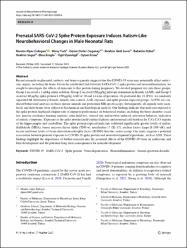| dc.contributor.author | Erdoğan, Mümin Alper | |
| dc.contributor.author | Turk, Miray | |
| dc.contributor.author | Doganay, Gizem Dinler | |
| dc.contributor.author | Sever, İbrahim Halil | |
| dc.contributor.author | Özkul, Bahattin | |
| dc.contributor.author | Söğüt, İbrahim | |
| dc.contributor.author | Eroğlu, Ebru | |
| dc.contributor.author | Uyanikgil, Yigit | |
| dc.contributor.author | Erbaş, Oytun | |
| dc.date.accessioned | 2023-12-16T09:09:45Z | |
| dc.date.available | 2023-12-16T09:09:45Z | |
| dc.date.issued | 2023 | en_US |
| dc.identifier.citation | Erdogan, M. A., Turk, M., Doganay, G. D., Sever, I. H., Ozkul, B., Sogut, I., Eroglu, E., Uyanikgil, Y., & Erbas, O. (2023). Prenatal SARS-CoV-2 Spike Protein Exposure Induces Autism-Like Neurobehavioral Changes in Male Neonatal Rats. Journal of neuroimmune pharmacology : the official journal of the Society on NeuroImmune Pharmacology, 10.1007/s11481-023-10089-4. Advance online publication. https://doi.org/10.1007/s11481-023-10089-4 | en_US |
| dc.identifier.uri | https://hdl.handle.net/20.500.12900/250 | |
| dc.description.abstract | Recent research on placental, embryo, and brain organoids suggests that the COVID-19 virus may potentially affect embryonic organs, including the brain. Given the established link between SARS-CoV-2 spike protein and neuroinflammation, we sought to investigate the effects of exposure to this protein during pregnancy. We divided pregnant rats into three groups: Group 1 received a 1 ml/kg saline solution, Group 2 received 150 mu g/kg adjuvant aluminum hydroxide (AAH), and Group 3 received 40 mu g/kg spike protein + 150 mu g/kg AAH at 10 and 14 days of gestation. On postnatal day 21 (P21), we randomly separated 60 littermates (10 male-female) into control, AAH-exposed, and spike protein-exposed groups. At P50, we conducted behavioral analyses on these mature animals and performed MR spectroscopy. Subsequently, all animals were sacrificed, and their brains were subject to biochemical and histological analysis. Our findings indicate that male rats exposed to the spike protein displayed a higher rate of impaired performance on behavioral studies, including the three-chamber social test, passive avoidance learning analysis, open field test, rotarod test, and novelty-induced cultivation behavior, indicative of autistic symptoms. Exposure to the spike protein (male) induced gliosis and neuronal cell death in the CA1-CA3 regions of the hippocampus and cerebellum. The spike protein-exposed male rats exhibited significantly greater levels of malondialdehyde (MDA), tumor necrosis factor alpha (TNF-alpha), interleukin-17 (IL-17), nuclear factor kappa B (NF-kappa B), and lactate and lower levels of brain-derived neurotrophic factor (BDNF) than the control group. Our study suggests a potential association between prenatal exposure to COVID-19 spike protein and neurodevelopmental problems, such as ASD. These findings highlight the importance of further research into the potential effects of the COVID-19 virus on embryonic and fetal development and the potential long-term consequences for neurodevelopment. | en_US |
| dc.language.iso | eng | en_US |
| dc.publisher | Springer | en_US |
| dc.relation.isversionof | 10.1007/s11481-023-10089-4 | en_US |
| dc.rights | info:eu-repo/semantics/openAccess | en_US |
| dc.subject | COVID-19 | en_US |
| dc.subject | SARS-CoV-2 | en_US |
| dc.subject | Başak proteini | en_US |
| dc.subject | Spike protein | en_US |
| dc.subject | Nörodejenerasyon | en_US |
| dc.subject | Neurodegeneration | en_US |
| dc.subject | Nöroinflamasyon | en_US |
| dc.subject | Neuroinflammation | en_US |
| dc.subject | Otizm spektrum bozukluğu | en_US |
| dc.subject | Autism spectrum disorder | en_US |
| dc.subject | Bağışıklık sistemi | en_US |
| dc.subject | Immune-System | en_US |
| dc.subject | Cinsiyet Farklılıkları | en_US |
| dc.subject | Sex-Differences | en_US |
| dc.subject | Beyin | en_US |
| dc.subject | Brain | en_US |
| dc.subject | Aktivasyon | en_US |
| dc.subject | Activation | en_US |
| dc.subject | Bozukluklar | en_US |
| dc.subject | Disorders | en_US |
| dc.subject | Gebelik | en_US |
| dc.subject | Pregnancy | en_US |
| dc.subject | Çocuklar | en_US |
| dc.subject | Children | en_US |
| dc.subject | Potansiyel müşteriler | en_US |
| dc.subject | Leads | en_US |
| dc.title | Prenatal SARS-CoV-2 Spike Protein Exposure Induces Autism-Like Neurobehavioral Changes in Male Neonatal Rats | en_US |
| dc.type | article | en_US |
| dc.department | İstanbul Atlas Üniversitesi, Meslek Yüksekokulu, Tıbbi Görüntüleme Teknikleri Ana Bilim Dalı | en_US |
| dc.authorid | Bahattin Özkul/0000-0003-3339-8329 | en_US |
| dc.contributor.institutionauthor | Özkul, Bahattin | |
| dc.relation.journal | Journal of Neuroimmune Pharmacology | en_US |
| dc.relation.publicationcategory | Makale - Uluslararası Hakemli Dergi - Kurum Öğretim Elemanı | en_US |

















